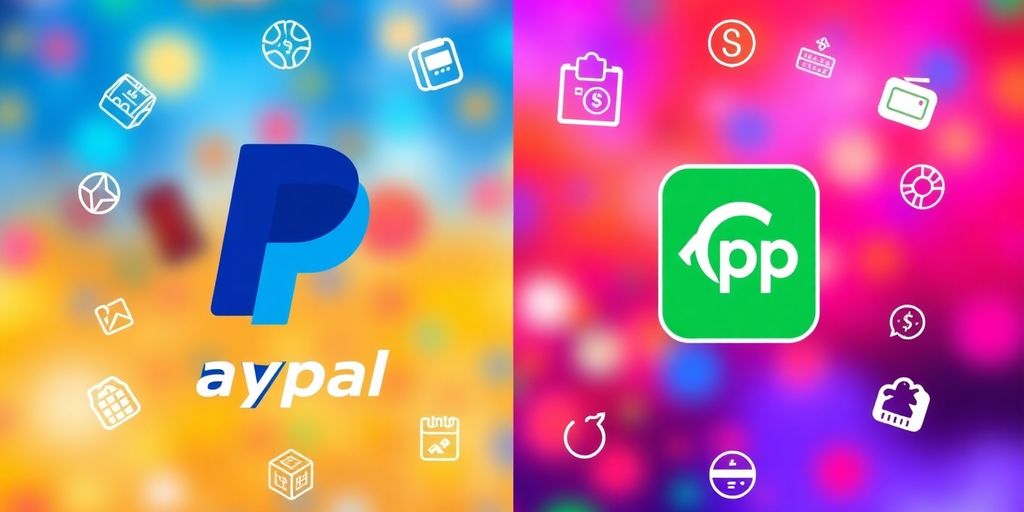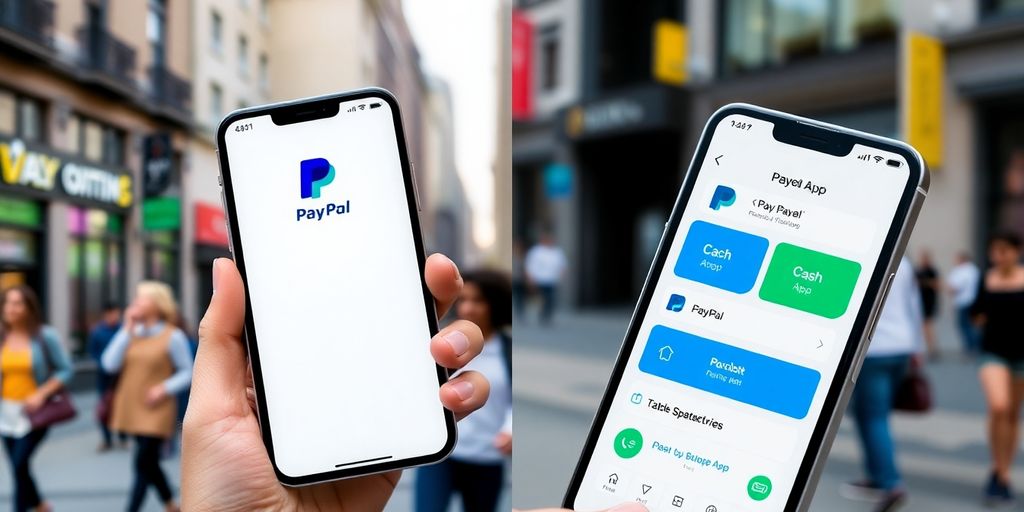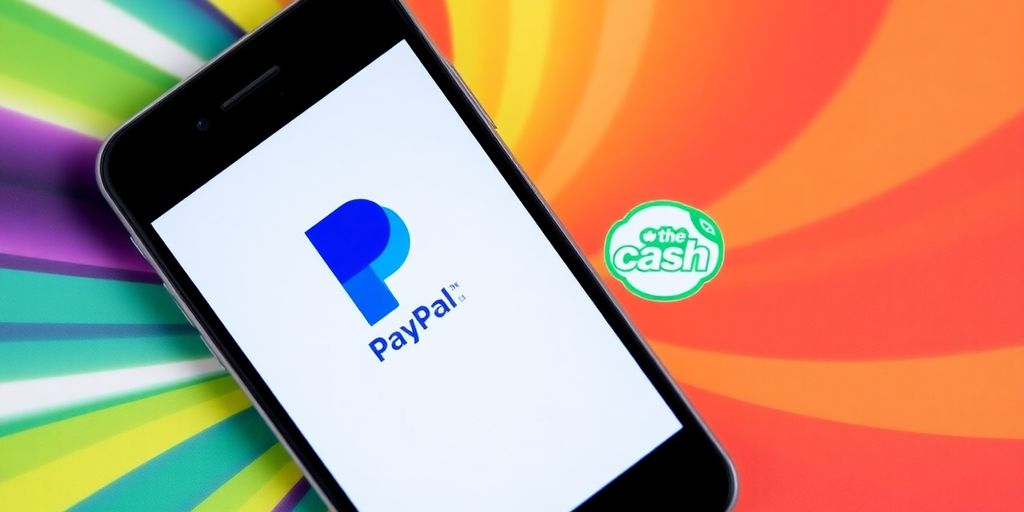Choosing between PayPal and Cash App in 2025? It's not as easy as it sounds. Both platforms have their pros and cons, and what works for one person might not work for another. From fees and features to security and global reach, there's a lot to think about. So, let’s break it down and figure out which one might be the better fit for you.
Key Takeaways
- PayPal is better for international transactions and offers extensive buyer and seller protections.
- Cash App shines with its low fees for domestic transfers and features like stock and Bitcoin trading.
- PayPal supports a wider range of currencies and has global accessibility compared to Cash App.
- Cash App is more user-friendly for quick, personal transactions and offers perks like a Cash Card.
- Both platforms have strong security measures, but PayPal’s dispute resolution is more robust.
Key Features That Set PayPal and Cash App Apart
Ease of Use and Interface Design
When it comes to usability, Cash App’s sleek and minimalist design makes it super easy to navigate, even if you’re not tech-savvy. It’s built for quick, on-the-go transactions, and everything feels simple and modern. PayPal, on the other hand, has a more functional but slightly dated interface. While it’s still user-friendly, especially for international users, it doesn’t have the same polished vibe as Cash App.
Here’s a quick comparison:
Transaction Speed and Reliability
Both platforms are fast, but Cash App edges out when it comes to instant transfers. Whether you’re paying a friend or sending money to family, the process is seamless and quick. PayPal is no slouch either, but sometimes extra verification steps can slow things down a bit. If you’re in a rush, Cash App might feel more reliable for those lightning-fast transactions. However, PayPal shines for larger, more complex transfers, especially for business purposes.
Unique Features for Everyday Users
Cash App packs some cool extras that make it stand out. For instance, it lets you trade stocks and Bitcoin directly from the app—perfect if you’re curious about investing but don’t want to deal with complicated platforms. It also comes with a Cash Card, which you can use like a debit card for everyday purchases.
PayPal, meanwhile, is all about versatility. It’s not just for personal use; it’s a beast when it comes to business transactions. From invoicing to buyer and seller protections, PayPal offers tools that make it a go-to for freelancers and online shoppers. PayPal’s payment methods for freelancers are particularly handy, offering flexibility for receiving payments via cards, accounts, or even in-person transactions.
If you’re all about simplicity and speed, Cash App might be your jam. But if you need a platform that can handle everything from shopping to business, PayPal’s got your back.
Comparing Fees: Which Platform Saves You More?
Domestic and International Transfer Costs
When it comes to transferring money, both domestically and internationally, the fees can quickly add up. Let’s break it down:
- Domestic Transfers:
- International Transfers:
If you’re just sending money to someone across town, both apps are pretty comparable. But for international transfers? Cash App is the clear winner if you’re in the U.S. or U.K. Otherwise, PayPal’s global reach might be your only option, albeit at a higher cost.
Business Transaction Fees Breakdown
For entrepreneurs and small businesses, every penny counts. Here’s how the two platforms stack up for business transactions:
PayPal offers more features for businesses, but those extra costs can eat into your profits. Cash App keeps it simple and slightly cheaper, but it’s not as robust for international commerce.
Hidden Charges to Watch Out For
Both platforms are pretty upfront about their fees, but there are still some hidden costs to consider:
- ATM Withdrawal Fees:
- Credit Card Top-Ups:
- Exchange Rate Margins:
If you’re someone who frequently uses these platforms for international payments or business, these fees can sneak up on you. Keep an eye on the fine print and always double-check before hitting "Send."
In the end, the better option depends on your specific needs. For personal use and occasional transfers, Cash App often comes out ahead. But if you’re managing a business or need global access, PayPal might be worth the extra cost—even if it stings a little.
User Experience: What Customers Are Saying
App Store and Google Play Ratings
When it comes to app ratings, both PayPal and Cash App have their pros and cons. PayPal scores slightly higher on app reliability, while Cash App often gets praise for its sleek design and ease of use. Here's a quick breakdown:
Users frequently mention that PayPal feels more "stable," especially for business transactions. On the flip side, Cash App is loved for its simplicity and quick setup for new users.
Customer Support Options
Customer support can make or break your experience. PayPal offers multiple support channels, including a 24/7 chat feature, email support, and even a phone line. Cash App, however, leans heavily on its in-app support and email, which some users find limiting.
- PayPal Support Highlights:
- Cash App Support Highlights:
While PayPal's support feels more "traditional," Cash App's approach is more modern but may leave you wanting if your issue is complex.
Real-World User Testimonials
"I’ve been using PayPal for years for my online business, and it’s been rock-solid. But when I just need to send a quick $20 to a friend, Cash App is way more convenient."
Real users often highlight that PayPal is better suited for professional use, while Cash App shines for personal, day-to-day transactions. The choice really depends on what you need most from your payment app.
For a deeper dive into how these platforms stack up, check out this comparison of Cash App and PayPal.
Security and Fraud Protection: Who Keeps Your Money Safer?
Encryption and Authentication Measures
When it comes to keeping your money secure, both PayPal and Cash App take security seriously. They use advanced encryption technologies to protect your data and transactions. Plus, two-factor authentication (2FA) is a standard feature on both platforms. This means even if someone gets your password, they’ll still need a second verification step to access your account. On mobile apps, features like Touch ID and PIN codes add an extra layer of protection.
Buyer and Seller Protections
PayPal shines here with its Buyer and Seller Protection programs. If you don’t receive an item or it’s not as described, PayPal’s got your back. Sellers also benefit from protections against unauthorized transactions. Cash App, on the other hand, doesn’t offer the same level of buyer-seller guarantees. That said, Cash App does monitor transactions for potential scams and flags suspicious activity.
Here’s a quick breakdown:
- PayPal: Offers reimbursement for unauthorized purchases and items not received.
- Cash App: Focuses more on monitoring and flagging suspicious transactions but lacks robust buyer protection policies.
Handling Disputes and Chargebacks
Disputes happen, and how they’re handled can make or break your trust in a payment platform. PayPal makes it easy to file disputes directly from your account, and their resolution center is pretty user-friendly. Cash App, however, requires you to contact their support team, which can sometimes feel like jumping through hoops.
If you’re a business user, PayPal’s chargeback process is more transparent and structured. Cash App, while improving, still has some catching up to do in this area.
If you’re someone who frequently buys or sells online, PayPal might feel like the safer bet thanks to its comprehensive protection features. Cash App is great for quick, casual transactions but may leave you wanting more when disputes arise.
Additional Perks: Beyond Money Transfers

Investment and Cryptocurrency Options
Both PayPal and Cash App have dipped their toes into the investment world, but they take different approaches. PayPal allows you to buy, hold, and sell cryptocurrencies like Bitcoin and Ethereum directly from your account. It’s straightforward and integrates well with their existing platform. Cash App, on the other hand, goes a step further by letting you invest in individual stocks as well as Bitcoin. This makes it a solid choice if you’re looking to dabble in both the stock market and crypto trading without downloading separate apps.
Debit and Credit Card Features
When it comes to cards, both platforms offer options tailored to their users. PayPal provides a debit card linked to your PayPal balance and even a credit card with cashback rewards. Cash App keeps it simpler with its Cash Card, a customizable debit card that connects directly to your Cash App balance. While PayPal’s cards might appeal to those looking for cashback perks, Cash App’s card is great for everyday spending and even offers discounts at select merchants through its Boost program.
Tax Filing and Other Services
PayPal shines when it comes to additional services like tax filing. They partner with platforms like TurboTax to make filing your taxes a little less painful, especially if you’re self-employed and use PayPal for business transactions. Cash App, on the other hand, offers its own tax filing service, Cash App Taxes, which is free to use. It’s a handy feature if you want everything in one place, but it’s not as robust as PayPal’s partnerships with established tax platforms.
If you’re someone who values extra features like investment tools or tax filing, these perks can make a big difference in choosing between Cash App and PayPal.
Global Reach and Accessibility
Availability Across Countries
When it comes to global accessibility, PayPal and Cash App take very different approaches. PayPal is available in over 200 countries, making it a true global player in the online payment space. On the other hand, Cash App is limited to the U.S. and the U.K., which might feel restrictive if you travel often or have international connections.
Here's a quick comparison:
If you’re someone who frequently works with international clients or shops online from global marketplaces, PayPal's extensive reach is a game-changer. The platform also supports multiple currencies, so you don’t have to worry about exchange rates every time you make a transaction.
Currency Conversion and Exchange Rates
PayPal shines here as well, offering automatic currency conversion for international payments. While there’s a small fee for this service, it’s incredibly convenient if you’re transferring money or making purchases in a different currency. Cash App, unfortunately, doesn’t support currency conversion at all—what you see is what you get.
Things to consider with PayPal's currency conversion:
- Exchange rates are slightly marked up compared to the market rate.
- There’s usually a conversion fee of around 3-4%.
- You can preview the conversion rate before confirming your transaction.
Language and Regional Support
PayPal also leads in this area, offering its platform in multiple languages to cater to users worldwide. Whether you're in Europe, Asia, or the Americas, you’ll find localized support and tools that make using PayPal a breeze. Cash App, on the other hand, sticks to English, which might be a barrier for non-English speakers.
If global accessibility and multi-language support are important to you, PayPal is the clear winner. Its ability to adapt to different regions and currencies makes it a versatile choice for users across the globe.
In summary, if you’re looking for a payment platform that fits into a global lifestyle, PayPal has the upper hand. Cash App’s simplicity works well for domestic use, but it just doesn’t compete on a worldwide scale.
Which Platform Fits Your Lifestyle?

Best for Personal Use
If you're all about keeping things simple and quick, Cash App might be your go-to. It's designed for people who want to send money fast, invest on the side, and maybe even use features like the Cash Card for daily spending. The app’s clean interface makes it super easy to navigate, and instant transfers are a breeze. However, if you’re someone who shops online a lot or needs buyer protection, PayPal might have the edge with its robust security features and global acceptance.
Best for Business Transactions
For small businesses or freelancers, PayPal is often the better choice. Why? It’s got tools like invoicing, payment tracking, and even support for international clients. Plus, it’s widely accepted by e-commerce platforms, which is a big deal if you’re selling products or services online. Cash App, while great for personal use, doesn’t offer the same level of business-focused features.
Best for International Transfers
If you’re sending money across borders, PayPal clearly takes the crown. Its global reach and currency conversion options make it a reliable choice for international transactions. Cash App, on the other hand, is more limited in this area, primarily serving users in the U.S. and U.K. If global accessibility is a must-have for you, PayPal is the way to go.
At the end of the day, your choice boils down to what you value most—speed and simplicity, or features and global reach. Both platforms have their strengths, so pick the one that matches your lifestyle best.
Choosing the right platform can make a big difference in your daily life. Whether you want to sell products, manage orders, or design your store, there’s a perfect fit for you. Explore our website to find the tools that match your needs and help you succeed!
Final Thoughts
So, is PayPal better than Cash App? Honestly, it depends on what you need. If you're all about quick, simple money transfers and maybe dabbling in stocks or Bitcoin, Cash App is a solid pick. But if you're running a business, need global payment options, or value buyer and seller protections, PayPal has the edge. Both have their quirks and strengths, so it really comes down to what fits your lifestyle better. Either way, you’ve got two great tools to make managing money a whole lot easier.
Frequently Asked Questions
What are the main differences between PayPal and Cash App?
PayPal is widely used for international transactions, business payments, and online purchases. Cash App is more focused on personal use, offering features like stock and Bitcoin trading, and free transfers between U.S. and U.K. users.
Which platform has lower fees for money transfers?
Cash App generally has lower fees for personal transfers, especially for domestic use. PayPal, while offering more global options, often charges higher fees for international transfers and currency conversion.
Can I invest in stocks or cryptocurrency using these platforms?
Cash App allows you to invest in stocks and Bitcoin directly within the app. PayPal supports cryptocurrency purchases but doesn’t offer stock trading options.
Which app is better for international payments?
PayPal is better for international payments as it supports over 100 countries. However, its fees for such transactions can be high. Cash App only supports free international transfers between the U.S. and U.K.
Are there any hidden fees I should watch out for?
With Cash App, instant transfers and credit card top-ups may incur fees. PayPal charges for currency conversion, international transfers, and certain business transactions, so always check the fee details.
How do the apps compare in terms of security?
Both apps use encryption, two-factor authentication, and fraud protection. PayPal also offers robust buyer and seller protections, making it a safer option for online shopping and business transactions.


